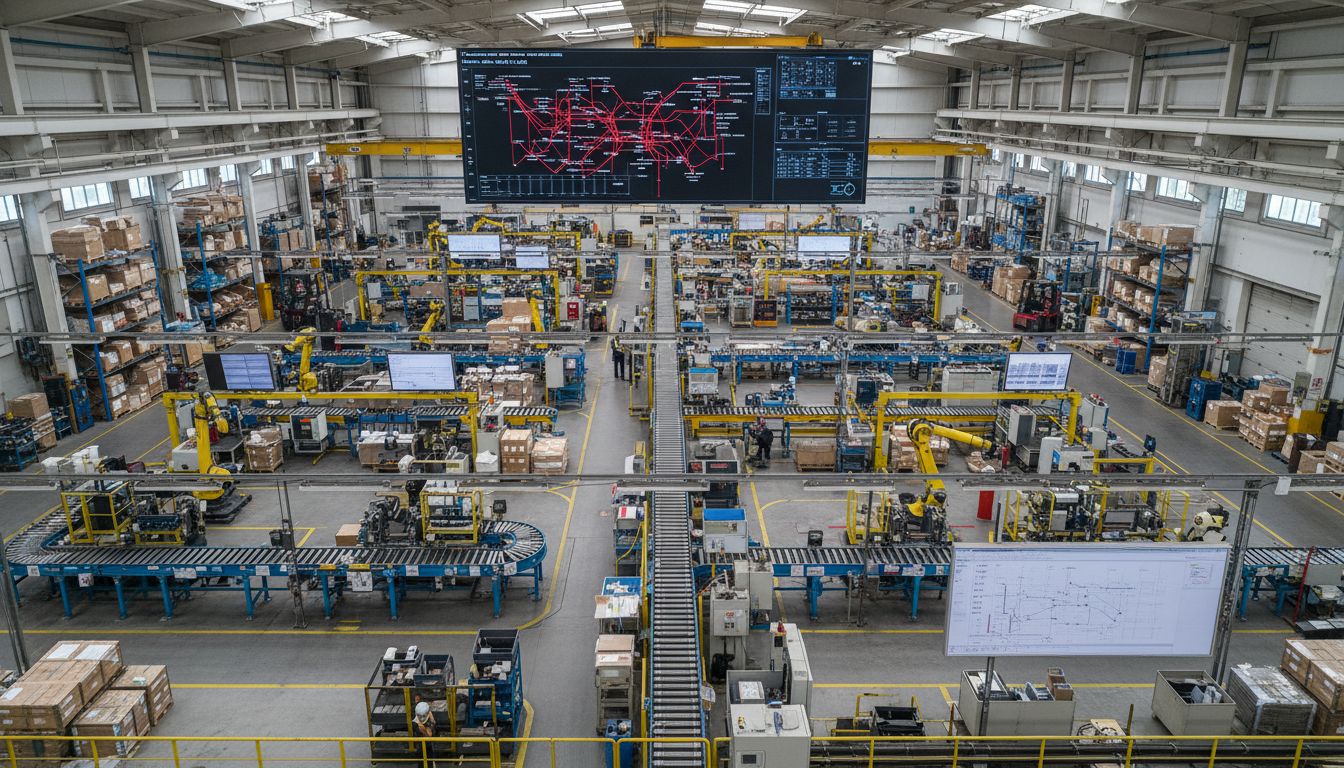Understanding What is Responsible AI for Business Success

Responsible AI is shaking up how businesses build and use technology. Some companies with strong responsible AI programs report higher profitability and improved talent retention, according to MIT Sloan Management Review. That might seem like just another tech buzzword getting thrown around. Actually, the biggest impact comes from the way responsible AI puts humans firmly in charge, keeping ethics front and center every step of the way.
Table of Contents
- Defining Responsible AI: Concepts And Principles
- The Importance Of Responsible AI In Business
- How Responsible AI Works: Core Mechanisms
- Real-World Applications Of Responsible AI
- Key Challenges And Considerations For Implementation
Quick Summary
| Takeaway | Explanation |
|---|---|
| Emphasize human control in AI | AI should enhance human capabilities, ensuring humans steer decision-making processes and not just participate passively. |
| Establish clear governance structures | Organizations need robust frameworks with clear accountability to effectively oversee AI development and deployment. |
| Implement continuous monitoring | Ongoing evaluation allows businesses to identify potential biases and intervene before issues arise. |
| Focus on ethical development | AI systems should be designed with strong moral guidelines to prevent harmful outcomes and bolster public trust. |
| Create multidisciplinary teams | Collaborating with ethics experts can foster responsible AI practices and mitigate unforeseen risks. |
Defining Responsible AI: Concepts and Principles
Responsible AI represents a strategic approach to artificial intelligence development and deployment that prioritizes ethical considerations, human oversight, and systematic risk management. At its core, responsible AI ensures that technological innovations serve human interests while minimizing potential negative consequences.
The Fundamental Philosophy of Responsible AI
Responsible AI is not just about creating intelligent systems but creating intelligent systems that respect fundamental human values. Business owners must understand that AI is a tool designed to enhance human capabilities, not replace human judgment. The key principle is maintaining humans in control rather than humans being merely “in the loop”.
The approach centers on several critical dimensions:

- Ethical Development: Ensuring AI systems are designed with clear moral guidelines
- Transparency: Making AI decision making processes comprehensible and traceable
- Fairness: Preventing algorithmic bias and discriminatory outcomes
Practical Implementation of Responsible AI Principles
Implementing responsible AI requires a holistic strategy that goes beyond technical considerations. According to the National Institute of Standards and Technology, organizations must develop robust frameworks that address potential risks while maximizing technological potential.
This means business leaders need to:
- Establish clear governance structures for AI projects
- Create multidisciplinary teams that include ethics experts
- Develop continuous monitoring and evaluation mechanisms
The Business Case for Responsible AI
Beyond ethical considerations, responsible AI offers tangible business advantages. By prioritizing human oversight and ethical design, companies can build trust, reduce potential legal risks, and create AI systems that genuinely add value to their operational ecosystem. The goal is not just technological innovation but strategic, thoughtful integration that empowers teams and drives sustainable growth.
The Importance of Responsible AI in Business
Responsible AI has transformed from a theoretical concept to a critical strategic imperative for businesses seeking sustainable technological advancement. As artificial intelligence becomes increasingly integrated into organizational processes, understanding its broader implications has never been more crucial.
Mitigating Risks and Building Trust
Businesses cannot afford to treat AI as a black box technology. Responsible AI implementation goes beyond technical performance, focusing on creating systems that are transparent, accountable, and aligned with organizational values. By proactively addressing potential ethical and operational risks, companies can prevent costly mistakes and maintain stakeholder confidence.
Key risk mitigation strategies include:
- Identifying potential algorithmic biases before deployment
- Establishing clear accountability frameworks
- Implementing robust monitoring and intervention mechanisms
Economic and Competitive Advantages
According to MIT Sloan Management Review, companies with mature responsible AI programs experience significant competitive advantages. These organizations demonstrate enhanced product development, improved long-term profitability, and stronger talent attraction capabilities.
The economic benefits extend beyond immediate financial metrics:
- Reduced legal and reputational risks
- Enhanced customer trust and loyalty
- More resilient and adaptive technological ecosystems
Strategic Organizational Transformation
Responsible AI is not just a technological strategy but a comprehensive organizational approach. It requires cross-functional collaboration, continuous learning, and a commitment to ethical innovation. Business leaders must view AI as a strategic partner that amplifies human capabilities rather than a replacement for human expertise.
By embracing responsible AI principles, organizations can create technological solutions that are not only powerful and efficient but also fundamentally aligned with human values and societal expectations. The future of business innovation lies in technologies that are intelligent, ethical, and inherently human-centric.
How Responsible AI Works: Core Mechanisms
Responsible AI operates through sophisticated mechanisms that prioritize human values, ethical considerations, and systematic risk management. Unlike traditional AI approaches, these mechanisms embed comprehensive safeguards that transform artificial intelligence from a potential threat to a collaborative technological tool.
Architectural Design and Governance
The foundation of responsible AI lies in its architectural design principles. This approach goes beyond technical performance, integrating ethical considerations directly into the AI system’s core infrastructure. Business leaders must understand that responsible AI is not an afterthought but a fundamental design strategy.
Key architectural considerations include:
- Embedding transparency into algorithmic decision making
- Creating clear accountability pathways
- Designing systems with inherent bias detection capabilities
Technical Risk Management
Responsible AI requires continuous, proactive risk management. According to the National Institute of Standards and Technology, this involves developing robust frameworks that systematically identify, assess, and mitigate potential technological and ethical risks.
Risk management mechanisms involve:
- Regular algorithmic audits
- Comprehensive performance monitoring
- Dynamic adjustment of AI system parameters
Human-Centric Control Mechanisms
At the heart of responsible AI is the principle of human centrality. These mechanisms ensure that AI systems remain tools that augment human capabilities rather than autonomous decision makers. This approach requires sophisticated control interfaces that allow human operators to understand, intervene, and override AI recommendations.
Control mechanisms include:
- Transparent decision explanation interfaces
- Human validation checkpoints
- Configurable AI behavior boundaries
By integrating these core mechanisms, businesses can develop AI systems that are not just technologically advanced but fundamentally aligned with human values, organizational objectives, and societal expectations.
The following table highlights the core mechanisms of responsible AI, summarizing their essential features and the outcomes they help achieve in organizations.
| Mechanism | Key Features | Organizational Outcomes |
|---|---|---|
| Architectural Design & Governance | Transparency, accountability, bias detection | Ethical infrastructure, compliance |
| Technical Risk Management | Auditing, performance monitoring, risk mitigation | Early issue detection, reliability |
| Human-Centric Control Mechanisms | Decision explanations, human validation, boundaries | Human oversight, trust, flexibility |
Real-World Applications of Responsible AI
Responsible AI is transitioning from theoretical concept to practical implementation across diverse industries. Businesses are discovering that ethical AI deployment is not just a moral imperative but a strategic advantage that drives innovation, builds trust, and creates meaningful technological solutions.
Healthcare and Medical Research
In healthcare, responsible AI demonstrates remarkable potential for transformative impact. AI systems are being developed with strict ethical guidelines to support diagnostic processes, treatment planning, and medical research while maintaining patient privacy and preventing algorithmic discrimination.
Key healthcare applications include:
- Predictive disease screening with transparent decision making
- Personalized treatment recommendation systems
- Patient data protection and anonymization technologies
Financial Services and Risk Management
Financial institutions are leveraging responsible AI to create more equitable and transparent lending and investment processes. By implementing rigorous fairness protocols, these organizations can mitigate historical biases and develop more inclusive financial products.
According to Research on Responsible AI Practices, responsible AI in financial services focuses on:
- Eliminating discriminatory lending practices
- Creating explainable credit scoring algorithms
- Developing unbiased investment recommendation systems
Human Resources and Talent Management
Responsible AI is revolutionizing recruitment and employee management by introducing objective, transparent evaluation mechanisms. Companies are developing AI tools that support fair hiring practices, reduce unconscious bias, and create more inclusive workplace environments.
These AI systems prioritize:

- Anonymized candidate screening
- Skills-based talent matching
- Objective performance evaluation frameworks
By integrating responsible AI across these domains, businesses can create technological solutions that are not just efficient but fundamentally aligned with human values and societal expectations.
To clarify how responsible AI is adopted in different business areas, the following table summarizes key implementation domains, their focus areas, and example benefits for each.
| Domain | Main Focus Areas | Example Business Benefits |
|---|---|---|
| Healthcare & Medical Research | Ethical diagnostics, privacy, bias prevention | Improved patient outcomes, regulatory trust |
| Financial Services & Risk Mgmt | Fair lending, explainable credit scoring, bias checks | Increased inclusion, lower compliance risk |
| HR & Talent Management | Anonymized screening, skills matching, fair evaluation | Better hiring, more diverse workplaces |
Key Challenges and Considerations for Implementation
Implementing responsible AI is not a straightforward technical exercise but a complex strategic journey that requires nuanced understanding, comprehensive planning, and organizational commitment. Business leaders must navigate multiple interconnected challenges to successfully integrate ethical AI technologies.
Technical and Infrastructural Barriers
Responsible AI implementation demands sophisticated technological infrastructure and advanced technical capabilities. Organizations often encounter significant barriers when attempting to transition from traditional AI models to more transparent, accountable systems.
Key technical challenges include:
- Developing robust algorithmic transparency mechanisms
- Integrating complex ethical decision making frameworks
- Ensuring consistent performance across diverse computational environments
Organizational Cultural Transformation
Successful responsible AI adoption requires more than technological upgrades. It necessitates a fundamental cultural shift within organizations, challenging existing paradigms of technological development and decision making.
Cultural implementation considerations involve:
- Retraining technical and leadership teams
- Creating cross-functional ethical AI governance structures
- Developing new performance metrics that prioritize responsible innovation
Regulatory and Compliance Landscape
Navigating the evolving regulatory environment represents a critical implementation challenge. According to IEEE’s Ethically Aligned Design Guidelines, businesses must proactively develop AI systems that anticipate and comply with emerging legal and ethical standards.
Compliance strategies include:
- Continuous monitoring of international AI regulation
- Developing adaptable AI governance frameworks
- Creating transparent documentation of AI decision making processes
By understanding and strategically addressing these challenges, businesses can transform responsible AI from a theoretical concept into a practical, value-generating technological approach that respects both technological potential and human values.
Transform Responsible AI Principles Into Real Business Advantage
Struggling to bridge ethical AI concepts with real results for your growing business? The article highlighted how challenges like algorithmic bias, lack of transparency, and integration risks can stall your Responsible AI journey. If you want solutions that keep your team in control, enhance business valuation, and build real trust, it is time for a practical, proven approach.

Partner with Average Robot to put these Responsible AI principles into action. With our expert-designed roadmaps, tailored automations, and hands-on support, your business can unlock the benefits of transparent and ethical AI without the jargon or overwhelm. Schedule your consultation today and let us help you transform abstract ideas into competitive results. Visit Average Robot now and start building a smarter future for your organization.
Frequently Asked Questions
What is responsible AI?
Responsible AI refers to a strategic approach to artificial intelligence development and deployment that prioritizes ethical considerations, human oversight, and systematic risk management while ensuring that technological innovations serve human interests.
Why is responsible AI important for businesses?
Responsible AI is crucial for businesses as it helps mitigate risks, build trust with stakeholders, enhance customer loyalty, and provides a competitive advantage through transparent and ethical practices that align with organizational values.
How can organizations implement responsible AI principles?
Organizations can implement responsible AI by establishing governance structures, creating multidisciplinary teams that include ethical experts, and developing continuous monitoring mechanisms to ensure compliance with ethical standards.
What are the key challenges in adopting responsible AI?
Key challenges in adopting responsible AI include technical and infrastructural barriers, the need for organizational cultural transformation, and navigating the evolving regulatory and compliance landscape.
Recommended
- 5 Costly Mistakes Businesses Make When Implementing AI…What Successful Business Owners Do Differently. — Average Robot
- About | Discover Opportunities - Schedule Today — Average Robot
- AI and Leadership: What Owners Should Focus On — Average Robot
- Owner-Led AI Adoption Tips for Small Businesses — Average Robot
- The Impact of AI on SEO in 2025: Key Changes for Businesses




